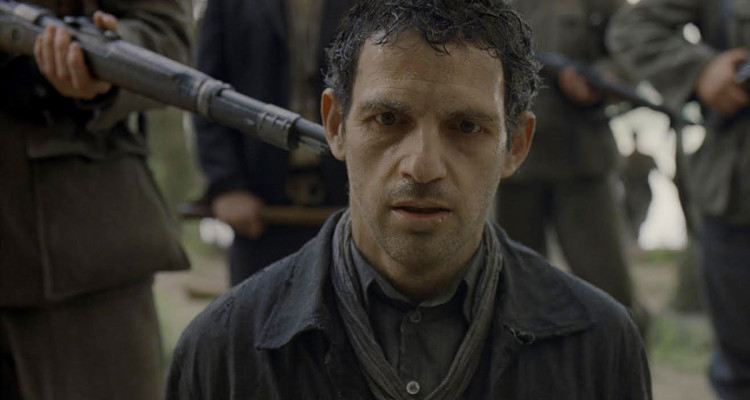With a tragic grace, Son of Saul tells a deeply personal story while constantly but subtly reminding you of the overwhelming scale of the Holocaust. It’s not an easily digestible film, it’s challenging, and it will change the way you think of that horrid time in human history.
When examining the abhorrence of the holocaust it’s usually the big picture that is the most shocking part. The sheer scale of atrocity makes my stomach turn, thinking about how many people were affected. Partially because the closer you get to the individual tragedy, the misanthropy becomes overwhelming. Son of Saul doesn’t take that scale for granted but brings an individuality to the barbarity. Knowing that this individual terror was multiplied by not by one hundred, not by one thousand, but six million, becomes incomprehensible.
A member of the Sonderkommando in the film, Saul is both a part of the coerced crew who keeps the Nazi death camps killing, forced to herd prisoners into the gas chamber, and a prisoner eventually fated for the same himself. After a young boy’s body escaped those ovens and is sent to be autopsied, Saul becomes obsessed with finding a rabbi to perform a proper funeral for the boy. Saul, maybe like us, can’t do anything to stop what already happened in life, but can do something to honor the memory of the lost. It’s not going to change anything that happened, but the simple honor, the ode to memory becomes Saul’s chance to do something personally meaningful in a bleak place.
Director László Nemes makes this Saul’s story from the very first shot: a blurry world until Saul walks into focus and for the rest of the film the camera is almost exclusively on him and his immediate surroundings. Our view and vision stays inside a 5-foot radius of where Saul is and what he’s doing, making any breaks to a wider scope unsettling. After leading prisoners to the gas chambers for months, he’s stopped looking at the individuals he corrals into the rooms. He’s turned off the part of him that would keep his head up and try to stop what’s happening. He’s just trying to survive, solely focusing on his world and his own path. In the first few minutes of the film, a stack of bodies piles up behind Saul, which would typically be either the penultimate horror in any other holocaust movie or be in focus, fullscreen. However, Saul sees this everyday and in survival mode, it’s background to him. He can’t focus on it, otherwise–here’s when the brilliance of this film just took my breath away– it forces you to think THAT SHIT has become so everyday that it’s not looming large. It’s literally background noise.
Because this has become Saul’s harsh everyday existence the story takes on a whole new level of hope when he finds a new purpose that seems barely obtainable. Saul’s a dead man walking, a shell of a person but when he starts to try arrange the boy’s covert funeral he goes on so many missions and there are so many false leads. Instead of a pattern of hero encounters challenge and masters said challenge it’s the opposite. Son of Saul is rife with individual failure and disappointment. Storylines that just stop and dead ends that lead him back to square one are what made this film so much more real. Instead of characters staying with Saul the whole film, they drop like flies, so when someone does circle back in the story, it’s surprising. But knowing that they, too, could just drop out of the film at any minute, makes every encounter nerve-racking.
The killing pit scene is hell.
As so much of the visual story is focused on Saul’s immediate vicinity the phenomenal sound design takes on the role of setting us in the larger world. Layers of sound create a bigger picture of the inescapable: echoing the sliding bodies, the brushes scrubbing floors, the barking background orders, the scraping shoveling of coal, the whispered shivers of shoveling ashes.
There’s a looming question of whether or not the boy Saul’s determined to bury is his actual biological son. Saul, in the film, claims the boy to be a child born out of wedlock. If this is Saul’s “real” son, the parallels of father/son and God/people are hard to ignore: a chosen people unprotected, a child neglected and legitimacy ignored until only posthumous customs can be performed. But regardless of bloodlines, and even though he was deep in the mires of the mechanics of genocide, Saul felt almost symbolic of the world outside of the Holocaust. He turns his view away from the horrors around him in order to carry on, seemingly forced to participate in a machine and system that he doesn’t have the power to stop or escape. But now, with no power to do anything for the living, he’s determined to do something for the dead.
Even as an audience member, it’s crushing to surrender to an obviously inescapable fate, realizing there’s nothing you can do for the living in this story. They’re gone, their real lives are gone. Their pain, their real pain is somehow still here, echoing through generations, compelling films like this to be made. Maybe because the grand scale doesn’t seem personal, like the roots of the hatred were too deep to be replicated. Maybe because we’re turning a blind eye to too many other atrocities all around us. Perhaps we still haven’t made the mission personal. That the greatest way to honor the dead is to respect the living.
9.5
Holocaust Capitalization
Total Score
9.5





